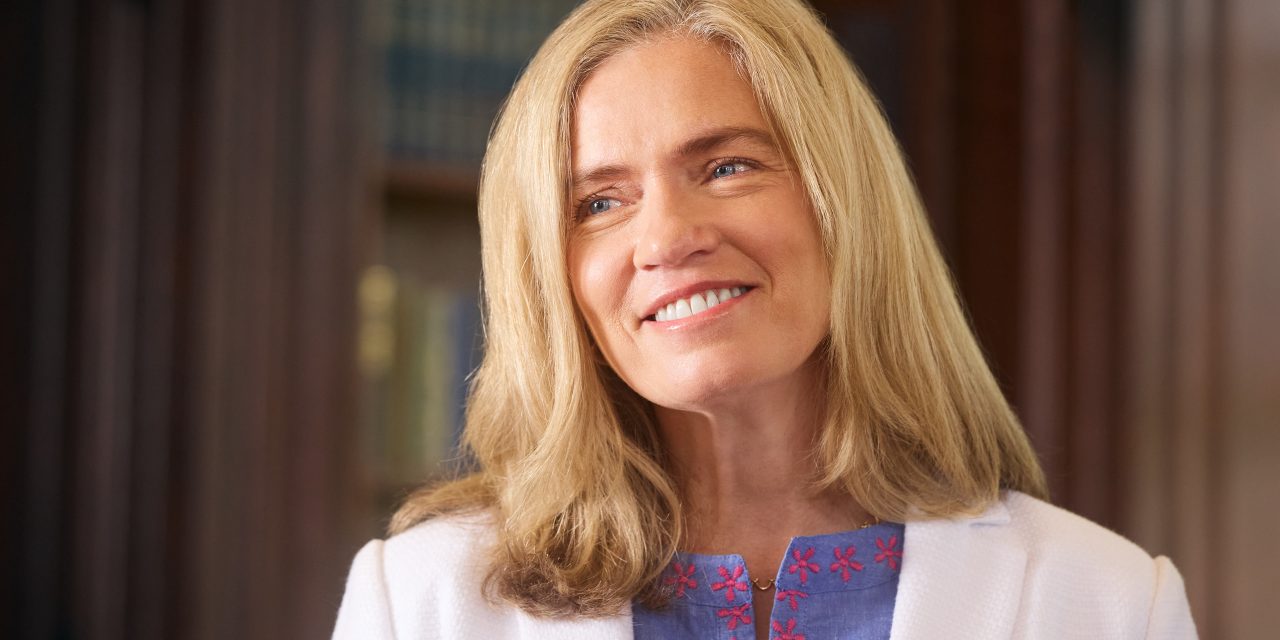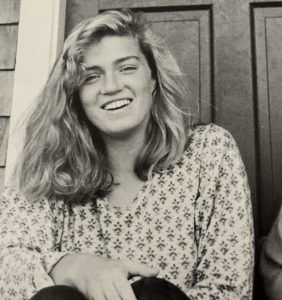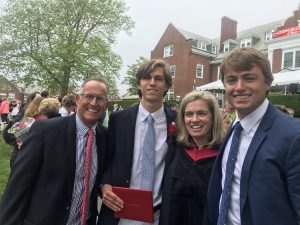
A Teacher First

Alixe Callen ’88 brings a wealth of experience and enthusiasm to her role as Milton’s new head of school
Story by Sarah Abrams
Photographs by Heather McGrath
Alixe Callen ’88 can’t remember a time when she didn’t want to be a teacher.
“Literally back to kindergarten, I knew that I would spend my life as an educator,” Callen said in an interview shortly after becoming Milton Academy’s 13th head of school. “As my life unfolded, I always knew deep inside that is what I would do.”
Callen arrived at Milton with a career portfolio that reflects a richness of experience and accomplishments. Among them, she helped start a high school in rural Arizona; led a highly ranked public high school of almost 2,000 students; and more recently, as head of school at St. George’s School, restructured academic departments into cross-disciplinary groupings that have resulted in more relevant, creative course design.
It was at Brown University where Callen began preparing for a career that would include leadership roles at public, charter, and independent schools across the country. While earning a b.a. (her major was in American civilization) and an m.a.t. (master of arts in teaching), Callen worked with the education reform advocate Theodore (Ted) Sizer. At Brown, Sizer had founded the Coalition of Essential Schools, a national school-reform organization formed in response to his landmark research, detailed in his book Horace’s Compromise. As a research and teaching assistant to Sizer, Callen worked on campus at Brown and with teachers around the country to further the principles of the coalition. This work continues to inform her vision and leadership.
Callen’s career began in Sedona, Arizona, where she taught English and social studies and helped start Sedona Red Rock High School. She spent three years designing a school that embraced the Coalition of Essential Schools’ ideals. “It may be the most revolutionary work I’ve done,” she said, “and what I realized through that experience was that while I love teaching, I want the opportunity to shape schools themselves, not just my own classroom.”
Her experience in Arizona led her to spend the next seven years working to earn her doctoral degree at the Harvard Graduate School of Education, where her values and priorities took shape. Callen’s doctoral work focused on communities that were undertaking major high school reform, seeking specifically to understand how upper middle- class families responded to changes that sought to enhance equity in school.
Nine years as a public school administrator came next, first as assistant principal at Needham High School and, four years later, as principal at Acton-Boxborough Regional High School, a top-ranked public high school of almost 2,000 students in the Boston suburb of Acton.

Alixe Callen’s senior yearbook picture, Milton Academy, 1988
Callen enjoyed her tenure at Acton-Boxborough, working in a setting that possessed a strong sense of community. But she soon grew frustrated by the lack of opportunities for making substantive programmatic changes. “While working with the students, faculty, and families of Acton and Boxborough was incredibly rewarding, I began to feel hamstrung by the imposition of multiple external demands,” Callen said.
Testing mandates and the entrenched policies emanating from the state made the chances for implementing sweeping change almost impossible. “After 15 years working in the field of school reform, I longed for more opportunities to work alongside teachers to implement more far-reaching improvements,” Callen said. “While Milton’s faculty works incredibly hard, we are blessed with time, space, and flexibility to deeply consider our practices in light of ongoing research about how students learn.”
Seeing an opportunity to accelerate greater change than was possible in public schools, Callen next took on roles in private school settings. She spent the following decade in independent school leadership, serving first as upper-school principal at Lakeside School in Seattle, Washington, and, the past six years, as head of school at St. George’s School in Middletown, Rhode Island, where she instituted a series of important changes—from dismantling traditional academic departments to better reflect interdisciplinary thinking, to formalizing a robust deij strategy, to helping develop a partnership with historically Black colleges and universities (hbcus) that brings hbcu students and teachers to St. George’s to explore independent schools’ practices and teaching.
“Our thought in restructuring the curriculum was, what if we started from the inside and decided that the groups that people meet in are part of a cohesive whole?” Callen said. “So often our work in curriculum design involves tinkering around the edges, creating electives that don’t require fundamental rethinking of the traditional disciplines. We moved from twelve departments to just five, ensuring that all educators were grouped into interdisciplinary departments, working together to create a relevant, thoughtful curriculum that will better serve today’s students.”
For now, Callen plans to spend much of her time listening and learning—visiting classes in all three divisions; attending events; getting to know students, parents, and alumni; and building on the legacy of community building that former Head of School Todd Bland leaves behind.
“For me, that’s critical. Some people think that community building is something you do on the side, but I think the most important intellectual work we do is to prepare students to live in and be productive members of communities.
“In our very divisive world, schools should be communities where barriers come down, where people listen to one another, where we talk across backgrounds and experiences. That starts with respect—saying ‘Thank you,’ holding the door, making room at the table. It then extends to watching out for one another, ultimately learning to champion each other. In classrooms, we should be building on each other’s thoughts, creating meaning together, never trying to upstage our peers.
“The leaders create that. If our kids can experience that here, then they can go out and recreate it elsewhere. I’m passionate about that. I feel that’s the most important work we do.”
Callen is excited by the opportunity to lead at a time of great social change—with today’s students facing unprecedented challenges: climate change, artificial intelligence, mounting polarization, increasing cultural diversity, and a shifting job market are just some of the factors facing students.
Milton’s legacy as an institution that instills in its students a strong sense of responsibility for tackling society’s most complex problems is one that Callen is committed to expanding upon. “Milton has always stood for something greater than itself,” she said. “That moral center is key to who we are. You just need to look at our alumni and see all of the incredible things they are doing—the many public servants and thought leaders who are making a difference in the world.”

Callen, with (L–R) her husband James Bailey, and sons Miles and Zander
Callen also looks forward to building on Milton’s position as an innovator in education—an institution that is continually evaluating best practices: seeking to understand what skills and knowledge our students need to be successful in a changing world, how best to assess those traits, and how to communicate our efforts to the larger world.
“As educators, we should be working to promote the teaching profession in general,” Callen said. “There’s an opportunity to tell our story and talk about the things that we’ve done well, but I also hope that we can learn from others.” Toward that end, Callen has already met with leaders in the Milton public school system in hopes of forging a partnership that will begin an exchange of ideas. “There is so much we can learn from our colleagues in public schools,” she said.
Ever the teacher, Callen also plans to fit classroom work into her schedule. At both Lakeside and St. George’s, she taught year-long sections of junior-year English, sharing her love of language with students. Although she’s holding off on that commitment for now, she is looking forward to opportunities to engage with students in all three divisions, perhaps sharing her deep love of literature and writing.”
In June, just weeks before assuming her role as head of school, Callen returned to Milton to join her classmates in celebrating their 35th reunion, coming full circle to where her intellectual journey began.
She recalls the awakening that took place for her as a 15-year-old, arriving at Milton from the suburban town of Bedford, New York. “At Milton, I felt there was a level of conversation that had not been present in my school life up until that point,” she said. “It definitely opened my eyes, and I loved that. I loved the way I was immersed in a different intellectual world than I had been previously. I loved what I read, I loved what I studied.
“In my experience, Milton is second to none as a place of thought and intellect. It is the most intellectually curious, dynamic learning environment I have known, and I’m thrilled to be returning to where it all started. I hope that the lessons I bring from all my experience and the respect I have for Milton—what it has given me and how it’s inspired me—will help to inspire and prepare new generations of Milton students.
“I am excited for the challenge.”




